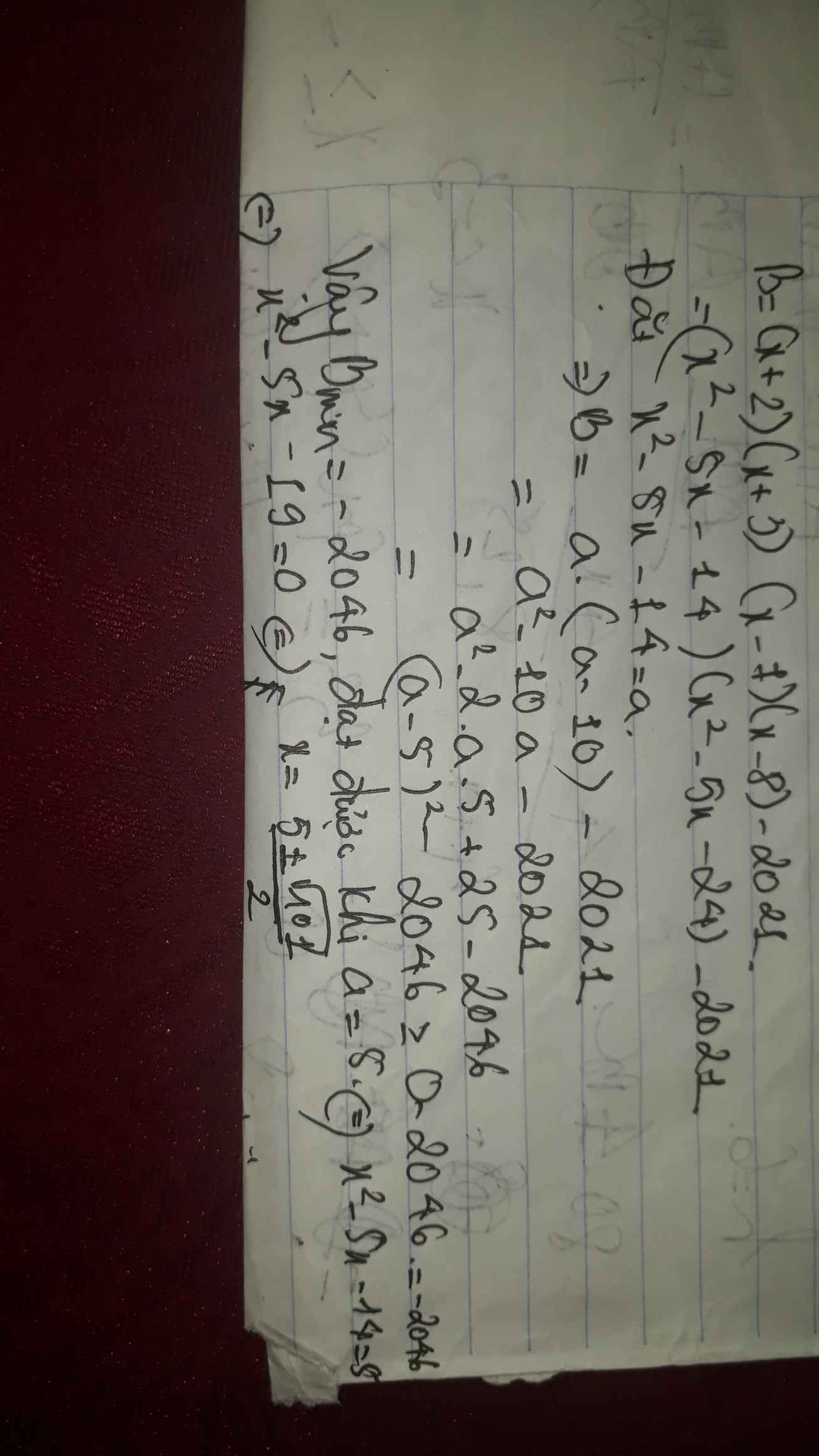
Hãy nhập câu hỏi của bạn vào đây, nếu là tài khoản VIP, bạn sẽ được ưu tiên trả lời.


\(1,\dfrac{3x-1}{4}+\dfrac{6x-2}{8}=\dfrac{1-3x}{6}\\ \Leftrightarrow1,\dfrac{3x-1}{4}+\dfrac{3x-1}{4}=\dfrac{1-3x}{6}\\ \Leftrightarrow2.\dfrac{3x-1}{4}=\dfrac{1-3x}{6}\\ \Leftrightarrow\dfrac{3x-1}{4}=\dfrac{1-3x}{12}\\ \Leftrightarrow12\left(3x-1\right)=4\left(1-3x\right)\\ \Leftrightarrow3\left(3x-1\right)=1-3x\\ \Leftrightarrow9x-3-1+3x=0\\ \Leftrightarrow12x-4=0\\ \Leftrightarrow x=\dfrac{1}{3}\)
\(2,\left(2x-1\right)^2+\left(x-3\right)\left(2x-1\right)=0\\ \Leftrightarrow\left(2x-1\right)\left(2x-1+x-3\right)=0\\ \Leftrightarrow\left(2x-1\right)\left(3x-4\right)=0\\ \Leftrightarrow\left[{}\begin{matrix}x=\dfrac{1}{2}\\x=\dfrac{4}{3}\end{matrix}\right.\)

\(a,3\left(2x-3\right)+2\left(2-x\right)=-3\\ \Leftrightarrow6x-9+4-2x=-3\\ \Leftrightarrow4x=2\\ \Leftrightarrow x=\dfrac{1}{2}\\ b,x\left(5-2x\right)+2x\left(x-1\right)=13\\ \Leftrightarrow5x-2x^2+2x^2-2x=13\\ \Leftrightarrow3x=13\\ \Leftrightarrow x=\dfrac{13}{3}\\ c,5x\left(x-1\right)-\left(x+2\right)\left(5x-7\right)=6\\ \Leftrightarrow5x^2-5x-5x^2-3x+14=6\\ \Leftrightarrow-8x=-8\\ \Leftrightarrow x=1\\ d,3x\left(2x+3\right)-\left(2x+5\right)\left(3x-2\right)=8\\ \Leftrightarrow6x^2+9x-6x^2-11x+10=8\\ \Leftrightarrow-2x=-2\\ \Leftrightarrow x=1\)
\(e,2\left(5x-8\right)-3\left(4x-5\right)=4\left(3x-4\right)+11\\ \Leftrightarrow10x-16-12x+15=12x-16+11\\ \Leftrightarrow-14x=-4\\ \Leftrightarrow x=\dfrac{2}{7}\\ f,2x\left(6x-2x^2\right)+3x^2\left(x-4\right)=8\\ \Leftrightarrow12x^2-4x^3+3x^3-12x^2=8\\ \Leftrightarrow-x^3-8=0\\ \Leftrightarrow-\left(x^3+8\right)=0\\ \Leftrightarrow-\left(x+2\right)\left(x^2-2x+4\right)=0\\ \Leftrightarrow\left[{}\begin{matrix}x=-2\\x\in\varnothing\left(x^2-2x+4=\left(x-1\right)^2+3>0\right)\end{matrix}\right.\)
Bài 4:
a: Ta có: \(3\left(2x-3\right)-2\left(x-2\right)=-3\)
\(\Leftrightarrow6x-9-2x+4=-3\)
\(\Leftrightarrow4x=2\)
hay \(x=\dfrac{1}{2}\)
b: Ta có: \(x\left(5-2x\right)+2x\left(x-1\right)=13\)
\(\Leftrightarrow5x-2x^2+2x^2-2x=13\)
\(\Leftrightarrow3x=13\)
hay \(x=\dfrac{13}{3}\)
c: Ta có: \(5x\left(x-1\right)-\left(x+2\right)\left(5x-7\right)=6\)
\(\Leftrightarrow5x^2-5x-5x^2+7x-10x+14=6\)
\(\Leftrightarrow-8x=-8\)
hay x=1

\(a,\Rightarrow3x\left(x-5\right)=0\Rightarrow\left[{}\begin{matrix}x=0\\x=5\end{matrix}\right.\\ b,\Rightarrow\left(x-3\right)\left(2x-1\right)=0\Rightarrow\left[{}\begin{matrix}x=3\\x=\dfrac{1}{2}\end{matrix}\right.\\ c,Đề.sai\\ d,Sửa:\left(x-2\right)^2-16\left(5-2x\right)^2=0\\ \Rightarrow\left[x-2-4\left(5-2x\right)\right]\left[x-2+4\left(5-2x\right)\right]=0\\ \Rightarrow\left(x-2-20+8x\right)\left(x-2+20-8x\right)=0\\ \Rightarrow\left(9x-22\right)\left(18-7x\right)=0\Rightarrow\left[{}\begin{matrix}x=\dfrac{22}{9}\\x=\dfrac{18}{7}\end{matrix}\right.\)
Tìm x biết
1. 2(5x-8)-3(4x-5)=4(3x-4)+11
2. (2x+1)2-(4x-1).(x-3)-15=0
3. (3x-1).(2x-7)-(1-3x).(6x-5)=0

1) \(\Rightarrow10x-16-12x+15=12x-16+11\)
\(\Rightarrow14x=4\Rightarrow x=\dfrac{2}{7}\)
2) \(\Rightarrow4x^2+4x+1-4x^2+13x-3-15=0\)
\(\Rightarrow17x=17\Rightarrow x=1\)
3) \(\Rightarrow\left(3x-1\right)\left(2x-7+6x-5\right)=0\)
\(\Rightarrow\left(2x-3\right)\left(3x-1\right)=0\)
\(\Rightarrow\left[{}\begin{matrix}x=\dfrac{3}{2}\\x=\dfrac{1}{3}\end{matrix}\right.\)
2: Ta có: \(\left(2x+1\right)^2-\left(4x-1\right)\left(x-3\right)-15=0\)
\(\Leftrightarrow4x^2+4x+1-4x^2+12x+x-3-15=0\)
\(\Leftrightarrow17x=17\)
hay x=1

1: Ta có: \(\left(x+3\right)^2-\left(x+2\right)\left(x-2\right)=4x+17\)
\(\Leftrightarrow x^2+6x+9-x^2+4-4x=17\)
\(\Leftrightarrow x=2\)
3: Ta có: \(\left(2x+3\right)\left(x-1\right)+\left(2x-3\right)\left(1-x\right)=0\)
\(\Leftrightarrow2x^2-2x+3x-3+2x-2x^2-3+3x=0\)
\(\Leftrightarrow6x=6\)
hay x=1

1) \(\dfrac{3x}{4x-8}\)
\(ĐKXĐ:4x-8\ne0\Leftrightarrow x\ne2\)
2) \(\dfrac{2x}{x^2-9}\)
\(ĐKXĐ:x^2-9\ne0\Leftrightarrow\)\(\left\{{}\begin{matrix}x\ne3\\x\ne-3\end{matrix}\right.\)
3) \(\dfrac{6}{x^3+1}=\dfrac{6}{\left(x+1\right)\left(x^2-x+1\right)}\)
\(ĐKXĐ:\)\(x+1\ne0\Leftrightarrow x\ne-1\)
(do \(x^2-x+1=\left(x-\dfrac{1}{2}\right)^2+\dfrac{3}{4}\ge\dfrac{3}{4}>0\))
4) \(\dfrac{6x^2}{x^2-2x+1}=\dfrac{6x^2}{\left(x-1\right)^2}\)
\(ĐKXĐ:x-1\ne0\Leftrightarrow x\ne1\)
5) \(\dfrac{x-2}{x^2+3}\)
Do \(x^2+3>0\forall x\in R\)
Vậy biểu thức trên xác định với mọi x
6) \(\dfrac{2x}{x^2+3x+2}=\dfrac{2x}{\left(x+1\right)\left(x+2\right)}\)
\(ĐKXĐ:\)\(\left\{{}\begin{matrix}x+1\ne0\\x+2\ne0\end{matrix}\right.\)\(\Leftrightarrow\left\{{}\begin{matrix}x\ne-1\\x\ne-2\end{matrix}\right.\)

a: \(3\left(x-3\right)-6x=0\)
=>\(3x-9-6x=0\)
=>-3x-9=0
=>3x+9=0
=>3x=-9
=>\(x=-\dfrac{9}{3}=-3\)
b: Đề thiếu vế phải rồi bạn
c: \(2\left(x-3\right)+3x=9\)
=>2x-6+3x=9
=>5x-6=9
=>5x=6+9=15
=>x=15/5=3
d: \(x\left(x-11\right)+2\left(x-11\right)=0\)
=>\(\left(x-11\right)\left(x+2\right)=0\)
=>\(\left[{}\begin{matrix}x-11=0\\x+2=0\end{matrix}\right.\Leftrightarrow\left[{}\begin{matrix}x=11\\x=-2\end{matrix}\right.\)
e: \(x\left(x+2\right)+8=x^2\)
=>\(x^2+2x+8=x^2\)
=>2x+8=0
=>2x=-8
=>x=-8/2=-4
f: \(8\left(x+1\right)+2x=-2\)
=>\(8x+8+2x=-2\)
=>10x=-2-8=-10
=>\(x=-\dfrac{10}{10}=-1\)
g: 12-3(x+2)=0
=>3(x+2)=12
=>x+2=12/3=4
=>x=4-2=2

a) ( 3x + 2 )( x - 1 ) - ( x + 2 )( 3x + 1 ) = 7
<=> 3x2 - x - 2 - ( 3x2 + 7x + 2 ) = 7
<=> 3x2 - x - 2 - 3x2 - 7x - 2 = 7
<=> -8x - 4 = 7
<=> -8x = 11
<=> x = -11/8
b) ( 6x + 5 )( 2x + 3 ) - ( 4x + 3 )( 3x - 2 ) = 8
<=> 12x2 + 28x + 15 - ( 12x2 + x - 6 ) = 8
<=> 12x2 + 28x + 15 - 12x2 - x + 6 = 8
<=> 27x + 21 = 8
<=> 27x = -13
<=> x = -13/27
c) 2x( x + 3 ) - ( x + 1 )( 2x + 1 ) - 5 = 9
<=> 2x2 + 6x - ( 2x2 + 3x + 1 ) - 5 = 9
<=> 2x2 + 6x - 2x2 - 3x - 1 - 5 = 9
<=> 3x - 6 = 9
<=> 3x = 15
<=> x = 5
d) ( 5x + 3 )( 4x - 7 ) - ( 10x + 9 )( 2x - 3 ) = 10
<=> 20x2 - 23x - 21 - ( 20x2 - 12x - 27 ) = 10
<=> 20x2 - 23x - 21 - 20x2 + 12x + 27 = 10
<=> -11x + 6 = 10
<=> -11x = 4
<=> x = -4/11
a, \(\left(3x+2\right)\left(x-1\right)-\left(x+2\right)\left(3x+1\right)=7\Leftrightarrow-8x-4=7\Leftrightarrow x=-\frac{11}{8}\)
b, \(\left(6x+5\right)\left(2x+3\right)-\left(4x+3\right)\left(3x-2\right)=8\Leftrightarrow27x+21=8\Leftrightarrow x=-\frac{13}{27}\)
c, \(2x\left(x+3\right)-\left(x+1\right)\left(2x+1\right)-5=9\Leftrightarrow3x-6=9\Leftrightarrow x=5\)
d, \(\left(5x+3\right)\left(4x-7\right)-\left(10x+9\right)\left(2x-3\right)=10\Leftrightarrow-11x+6=10\Leftrightarrow x=-\frac{4}{11}\)

1. \(x^2+2x+6\)
= \(\left(x^2+2x+4\right)-4+6\)
= \(\left(x+2\right)^2+2\)
Vì \(\left(x+2\right)^2\ge0\)nên \(\left(x+2\right)^2+2\ge2\)
Vậy GTNN của biểu thức là 2 khi x = -2
1. \(x^2+2x+6\)
= \(\left(x^2+2x+1\right)-1+6\)
= \(\left(x+1\right)^2+5\)
Vì \(\left(x+1\right)^2\ge0\Rightarrow\left(x+1\right)^2+5\ge5\)
Vậy GTNN của biểu thức là 5 khi x = -1
(Câu vừa nãy đánh sai thế giải sai luôn, còn câu này sửa lại đã đúng)